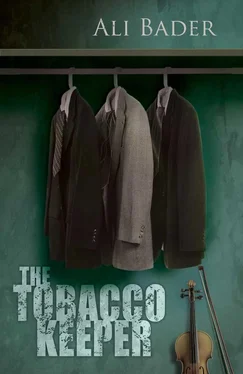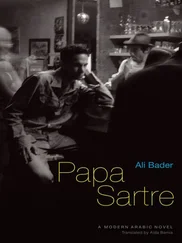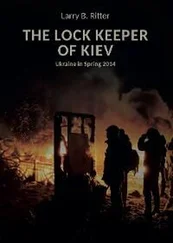Yousef stood in the long line with Farida carrying Meir, each with a ‘final exit’ permit and a photograph. The line was made up of Jews wearing their finest clothes. Unable to carry any valuables, they had sold their gold, their furniture, their elegant houses and cars, and had bought hats, tuxedos and starched shirts. The women were wearing elegant skirts and expensive suits. Yousef looked at the line and burst out laughing; it looked more like a queue for a party than for emigration. What a ridiculous sight! They moved slowly forward in front of the inspection officers. The officers took the clothes out of the suitcases and ordered the Jews to take off their shoes, shirts and jackets. When the man standing in line in front of Yousef took off his clothes, the policemen burst out laughing, for the man was wearing four shirts and three pairs of trousers, one on top of the other.
‘He has to remove his shoes! We need to check he’s not wearing another pair underneath,’ the customs officer shouted.
Neither Yousef nor Farida were wearing anything new or expensive. They went in their ordinary clothes and bought nothing new for Meir. They gave away all their furniture and books to friends. Like two philosophers, they stood with a small suitcase containing essential clothes and items. Neither of them felt any sense of weariness. They felt numbed as they stood in line, watching the other people. As though in a dream, they couldn’t believe what was happening. They gazed with cold detachment as their steel suitcases were inspected, their few clothes spread out, their documents and certificates torn to pieces, their soap bars crushed over the clothes and their shoes inspected to make sure that no gold was being smuggled in.
In two important letters that I received in Baghdad, Farida detailed the history of Yousef’s immigration to Israel and the years he’d spent there. It’s also important to say a few things about Farida.
(Farida Reuben was a woman of average beauty. She was very slim and had large dark eyes. After graduating from Laura Khedouri School in Baghdad, she joined the Women’s College to study Arabic literature. Because she felt that her college education was rather removed from practical life, she embarked on the task of educating herself, especially as she was proficient in English and French, in addition to Hebrew and Arabic. Hoping to become a full-time writer one day, she enrolled at university as soon as she arrived in Israel. She majored in Arabic literature and continued her studies until she obtained her doctorate. She then started teaching at Jerusalem University.)
Farida related that as soon as the plane landed in Israel, all the passengers shouted, ‘ Shalom Haber! ’. But the Ashkenazim didn’t respond, they just sprayed them with DDT to prevent them from carrying their Iraqi germs into the Promised Land. They were then transported in cattle trucks to the quarantine camp in Shaar Ha-Aliya, the ‘Immigrant Gateway’. They stood in line for vaccination and in food queues for half a boiled egg and five olives each. Two days later, Yousef, Farida and Meir were taken to another camp, with two other families, in a large vehicle designed for transporting cattle. At the camp, Yousef had to learn to stand in line for water, for the toilet and for bread. He had to learn to buy meat, eggs and butter using coupons and to work as a builder.
Yousef sat, moving his fingers in the air as though playing music.
In Israel, time had come to a complete standstill. Life was monotonous and unchanging. Yousef watched the passing of the seasons, one after the other. He recalled the old days in Baghdad and relived them in the present. He felt that he was living outside time. His little diary was full of the tedious rhythm of immigrant life: the pale faces, the dismal routine of soldiers and the total absence of joy, wonder and beauty. He searched for an answer but found none, although what he was looking for was to be found in a mysterious and simple enough explanation. It was to be found in a simple metaphysical image that was like an invisible bridge between him and the unknown. He realized that truth was granted to no one and that the Promised Land had been promised long ago. Although he felt hesitant and giddy, and was full of sorrow and conflict, the whole world seemed to urge him to leave.
His decision to return to Iraq was final and categorical. He had no doubts. [ Farida wrote in detail about his idea in an explanatory note appended to one of the letters sent to her from Tehran, dated January 1952. He also offered the same explanation in his diary. ]
At the beginning, Yousef joined Rakah, the Israeli Communist Party. That same year, he met Emile Habibi, who was rather plump with black hair combed back and a moustache that gently outlined his upper lip. Yousef spent lovely evenings with the communist intellectual Emile, who later became a writer. They had heated discussions about the changes that were happening to Arabic literature. All the evidence proves that it was Emile who arranged Yousef’s escape to Moscow once Yousef had told him of his desire to return to Iraq. One day Emile came running, his face sweating, and wearing a striped navy blue jacket and a white shirt. He stood in front of Yousef smiling, an elegant silk scarf tied around his neck. (Yousef Saleh used to call him the elegant communist.) Emile gave him a piece of paper written in Russian, an invitation to give a concert in Moscow. Yousef felt extremely happy. Not only would he travel to Moscow, but he would also be returning to music and giving a recital in front of an audience.
The following day, Yousef stood with his arms dangling at his sides in front of comrade Klausner. The curtains were drawn in the modest office located in an area far from the city centre. Without looking at him directly, Klausner said, ‘You’re travelling to Moscow for this big concert and coming back, right?’
Yousef answered him coldly, ‘Yes.’
In her letter, Farida said, ‘He didn’t sleep a wink from the moment he got the plane ticket. He stayed up late, distressed at the prospect of leaving me and his son Meir. But he was also happy that he’d got a ticket to Moscow, and on to Tehran. According to his plan, Baghdad would be the next leg of his trip. He said that we could join him later.’
Yousef believed that the Iraqi Jews would return to Baghdad, or at least most of them. He believed that the government would retract its decision to strip them of their nationality and would return their property. It would be natural for them then to return because Israel was nothing but a wasteland compared to the sophistication of Baghdad. Why should all those traders, craftsmen, employees, army officers and doctors work as casual labourers in a tiny, underdeveloped country?
All the documents in our possession confirm that Yousef arrived in Moscow in the evening. But it’s not clear how he spent his first week there, for he didn’t write anything about his feelings during the concert or afterwards. The only person he met in Moscow at that time was Kakeh Hameh, who told me about it when I met him later. But Hameh didn’t attend the concert and knew nothing about it. The only thing he told me was that a comrade had asked him to contact another communist who wanted to go to Tehran. That was how he’d arranged for him to get a fake passport in the name of Haidar Ali, which would allow him later to enter Iraq. That was the only task assigned to Kakeh Hameh. But Yousef later wrote about this task in more detail. In a separate letter that he sent to Farida from Moscow, dated one week after his arrival, he told her that he’d succeeded in contacting some Iraqi communists and had told them of his wish to return to Baghdad. He also told her about his meeting with Kakeh Hameh and many other things, including attending concerts given by Mark Goezler, the thin, silver-haired German musician. Yousef created a venerable image of him in his imagination, which lived on in his memory for some time. In the same letter, he described to her how he had walked in the freezing cold of Moscow, filled with ecstasy as he took a route that crossed fields and passed buildings wrapped in mist. He’d walked with his hands in his coat pockets, condensation rising from his nose and mouth and vanishing in the air. Nothing disturbed the stillness except the screams of seagulls diving in the air and the sounds of sledges as they slid hastily away. When he’d entered the large concert hall, all the seats and stalls had been completely empty. He’d remained there until the hall began to fill up. When the conductor began and the music started, his eyes welled up with tears. By the end of the concert, he was totally oblivious of everything around him. He later walked along the wet roads, passing pedestrians, cars, cows, dogs and sledges, and overwhelmed by a profound feeling of ecstasy.
Читать дальше












